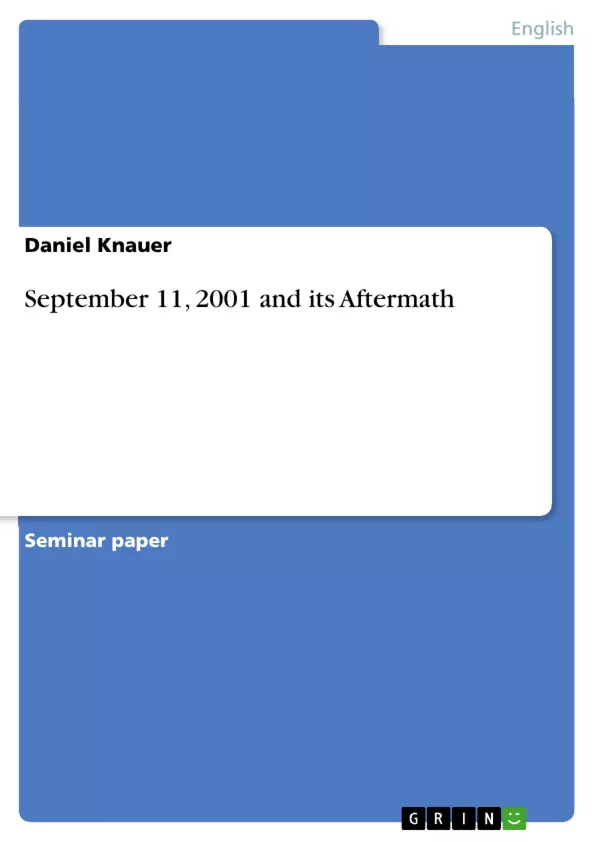September 11, 2001 saw horrible events in New York City and Washington, D.C., which have had a huge impact on people's thinking, judgement and behavior. This survey gives a timeline of the events on that historical day and reflects some of the immediate consequences, both within the U.S.A. and abroad, referring to various issues of German and international news broadcasts (Tagesschau, Weltspiegel, Auslandsjournal, CNN.com, The Economist, Newsweek). The point of view is from Germany in May 2002.
Inhaltsverzeichnis (Table of Contents)
- A Chronology of that very day
- B Consequences in US foreign policy
- 1 Military consequences
- 2 Political issues
- C Domestic policy, public mood
- D The “axis of evil” - Or: What's next? Who's next?
- E What has changed?
- F Topics for discussion
- Appendix: Handout
Zielsetzung und Themenschwerpunkte (Objectives and Key Themes)
This text aims to provide a chronological overview of the events of September 11, 2001, and their aftermath, focusing on the consequences for US foreign and domestic policy. It also explores the public mood in the United States following the attacks. Key themes include: * The immediate aftermath of the attacks, including the chronology of events and the initial reactions to the tragedy. * The consequences for US foreign policy, particularly the military response in Afghanistan and the growing suspicion towards Islamic fundamentalists, including al-Qaeda and Saddam Hussein. * The impact on domestic policy and public mood in the United States, including the increased focus on security and the shift in public opinion toward the Bush administration. * The emergence of the "axis of evil" concept and the unresolved questions surrounding the future course of US foreign policy.Zusammenfassung der Kapitel (Chapter Summaries)
The first chapter, "Chronology of that very day," provides a detailed account of the events of September 11, 2001, from the first plane crashing into the World Trade Center to the collapse of the Pentagon. The chapter also highlights the heroism of individuals like Todd Beamer, who fought back against the hijackers on Flight 93. The second chapter, "Consequences in US foreign policy," explores the implications of the attacks for US foreign policy. The chapter examines the military response in Afghanistan, the suspicion towards Islamic fundamentalists, and the various actors involved in the conflict, including al-Qaeda, Saddam Hussein, and the Taliban. The third chapter, "Domestic policy, public mood," discusses the impact of the attacks on US domestic policy and public opinion. The chapter focuses on the increased emphasis on security, the growing trust in the Bush administration, and the shift in public perception of the United States' vulnerability. The fourth chapter, "The 'axis of evil' - Or: What's next? Who's next?," addresses the emergence of the "axis of evil" concept and the unresolved questions surrounding the future course of US foreign policy. The chapter highlights the uncertainty surrounding potential military actions against Iraq, Iran, and North Korea and the challenges of protecting American civilians from future attacks.Schlüsselwörter (Keywords)
The primary keywords and focus topics of the text include: September 11 attacks, terrorism, US foreign policy, military intervention, Afghanistan, al-Qaeda, Saddam Hussein, Taliban, domestic policy, public mood, axis of evil, security, homeland security, vulnerability, and the aftermath of the attacks.Frequently Asked Questions
What was the immediate military response to the 9/11 attacks?
The United States launched a military intervention in Afghanistan to target al-Qaeda and the Taliban regime.
What does the term "Axis of Evil" refer to?
It was a concept introduced by the Bush administration to describe countries like Iraq, Iran, and North Korea as potential threats to global security.
How did 9/11 change US domestic policy?
There was a massive shift toward homeland security, increased public trust in the administration for safety, and a heightened sense of national vulnerability.
Who was Todd Beamer?
Beamer was a passenger on Flight 93 who became a symbol of heroism for fighting back against the hijackers on September 11, 2001.
What sources were used for this survey?
The analysis refers to international news broadcasts like Tagesschau, CNN, The Economist, and Newsweek from the perspective of May 2002.
- Quote paper
- Daniel Knauer (Author), 2002, September 11, 2001 and its Aftermath, Munich, GRIN Verlag, https://www.grin.com/document/126775



